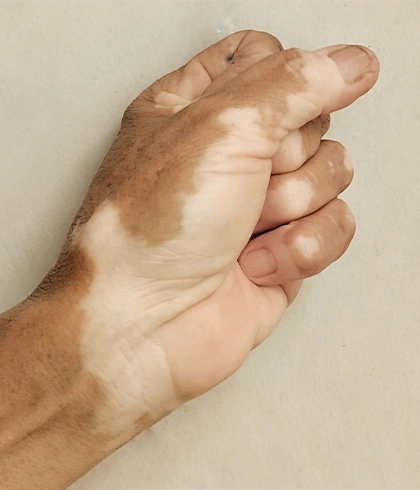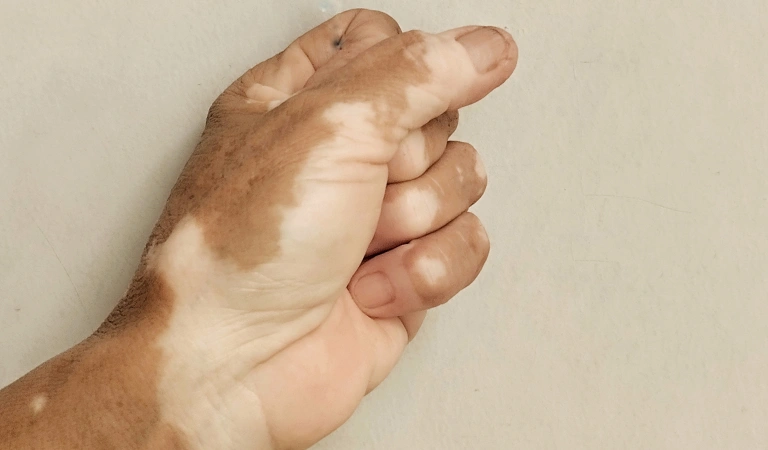

Is Vitiligo an Autoimmune Disease? Understanding the Condition and Treatment Options
Vitiligo, a condition characterised by white patches on the skin, has long been studied for its connection to autoimmunity. Understanding this autoimmune link is crucial for identifying effective treatments and enhancing the quality of life for those affected.
Let’s explore the relationship between vitiligo and autoimmunity, its challenges, and the advanced treatment strategies available, including those offered by Dr Batra’s®.
Take the Skin Evaluation Test to know your skin better.
Vitiligo and Autoimmunity: Unravelling the Connection
Below are key aspects of how vitiligo is connected to autoimmune processes within the body.
The Immune System’s Role in Vitiligo
Is vitiligo an autoimmune disease? While not definitively categorised as one, vitiligo is strongly linked to autoimmune processes. It develops when the immune system erroneously targets melanocytes—the cells responsible for producing melanin, the pigment that gives skin its colour. This autoimmune attack leads to the formation of white patches on the skin, often progressive and unpredictable.
Interestingly, this mechanism resembles other autoimmune disorders, such as lupus and thyroid conditions, where the immune system misidentifies healthy tissues as threats.
Evidence Linking Vitiligo to Autoimmunity
Several studies have demonstrated the presence of autoimmune antibodies in vitiligo patients. These antibodies specifically target melanocytes, the cells responsible for producing skin pigment, further supporting the autoimmune nature of the disease. The destruction of melanocytes by these antibodies leads to the characteristic white patches seen in vitiligo patients.
In addition to these findings, vitiligo often co-occurs with other autoimmune conditions such as alopecia areata, rheumatoid arthritis, and Type 1 diabetes. This co-occurrence reinforces the connection between vitiligo and other autoimmune disorders.
For example, individuals with vitiligo may develop alopecia areata, an autoimmune condition that results in hair loss, or they may be more susceptible to rheumatoid arthritis, a condition where the immune system attacks the joints.
Furthermore, genome-wide association studies (GWAS) have identified multiple genetic loci associated with vitiligo, many of which are also linked to other autoimmune diseases. This genetic overlap suggests a common underlying mechanism involving the immune system.
Additionally, research has shown that vitiligo patients often exhibit a higher prevalence of thyroid antibodies, indicating a link between vitiligo and thyroid autoimmune diseases such as Hashimoto's thyroiditis and Graves' disease. This connection highlights the importance of regular screening and monitoring for associated autoimmune conditions in individuals with vitiligo.
Genetic and Environmental Interplay
Vitiligo causes can be influenced by a combination of genetic and environmental factors. Genetic predisposition plays a significant role, as certain genetic variations can increase susceptibility to developing the condition.
Additionally, environmental aspects such as stress, trauma, and infections may trigger autoimmune responses in genetically predisposed individuals, leading to the onset of vitiligo.
- Stress, whether emotional or physical, can impact the immune system and potentially initiate or worsen vitiligo. This stress can lead to the overproduction of stress hormones, which in turn can disrupt the immune system’s balance and trigger autoimmune responses.
- Skin trauma, including cuts, burns, or even excessive friction, can also provoke an immune response that results in depigmentation. This is known as the Koebner phenomenon, where new vitiligo lesions appear on previously injured skin.
- Infections, particularly those that activate the immune system, may contribute to the development of vitiligo by disrupting normal melanocyte function. Viral and bacterial infections can trigger inflammatory responses, leading to an autoimmune attack on melanocytes.
- Exposure to certain chemicals and sunburn can act as environmental triggers. These factors can cause oxidative stress, leading to damage in melanocytes and the immune system's subsequent targeting of these cells. For instance, sunburn can cause significant skin inflammation, which can exacerbate vitiligo by inducing further melanocyte damage and loss.
The interplay between these genetic and environmental elements makes vitiligo a complex condition, with variability in how and when it manifests in different individuals.
Also Read: 5 facts you didn’t know about Vitiligo | Vitiligo is more than just a skin disorder
Challenges of Vitiligo as an Autoimmune Condition
Here are some of the key challenges associated with managing vitiligo symptoms as an autoimmune condition.
Unpredictable Progression
One of the most significant challenges of vitiligo is its unpredictable nature. The autoimmune responses that trigger the destruction of melanocytes can vary in intensity and spread, making it difficult to predict the progression of the condition.
Some individuals may experience a rapid spread of depigmented patches, while others may have a more gradual progression or periods of stability followed by flare-ups. This unpredictability can lead to significant psychological distress, as individuals may experience uncertainty about the future appearance of their skin and how it might affect their self-esteem and social interactions.
Additionally, the visible nature of vitiligo can make it a particularly distressing condition, contributing to anxiety and depression. Understanding and addressing the psychological impacts of vitiligo are crucial components of comprehensive care for individuals living with this condition.
Impact on the Body Beyond Skin
While vitiligo symptoms primarily manifest as white patches on the skin, it's important to recognise that the autoimmune nature of the condition may have broader implications for overall health. Some research suggests that vitiligo may serve as a marker for systemic health risks, including an increased susceptibility to other autoimmune diseases. Individuals with vitiligo may be more likely to develop conditions such as thyroid disorders, type 1 diabetes, and pernicious anaemia.
Strategies to Manage Vitiligo as an Autoimmune Condition
If you are wondering how to stop vitiligo from spreading, the following are some effective strategies to manage vitiligo as an autoimmune condition.
Early Diagnosis and Monitoring
Early diagnosis of vitiligo is crucial to implement timely management strategies. By identifying the autoimmune activity early on, healthcare providers can monitor the progression of the condition and intervene with appropriate vitiligo treatment. Regular screenings for associated autoimmune diseases can also be beneficial, as early detection allows for proactive management.
Proactive monitoring involves regular check-ups with dermatologists and other specialists to track changes in skin pigmentation and overall health. Diagnostic tools like skin biopsy can help in the early detection of vitiligo and the assessment of its severity. Additionally, blood tests to measure autoantibodies and thyroid function can provide insights into potential associated autoimmune disorders.
By staying vigilant and maintaining regular health assessments, individuals with vitiligo can receive timely interventions that may help slow the progression of the disease and address any related health issues promptly.
Modulating the Immune System
Vitiligo treatment strategies focus on controlling the immune system's overactivity to manage and reduce the symptoms of the condition. Here are some common therapies:
- Immunomodulators: These medications help balance the immune response by restricting the activity of immune cells that mistakenly attack melanocytes. Immunomodulators can help slow the progression of vitiligo and promote repigmentation of the affected skin.
- Corticosteroids: These powerful anti-inflammatory drugs reduce inflammation and suppress autoimmune activity. Topical corticosteroids are often applied directly to the affected areas to decrease immune system activity and encourage repigmentation. They are particularly useful in the early stages of vitiligo when the patches are still developing.
- Phototherapy: This treatment involves controlled exposure to ultraviolet (UV) light, either UVB or UVA, to stimulate melanocyte production. Phototherapy can be administered using specialised light boxes or lasers and is often combined with other treatments to enhance its effectiveness. Regular phototherapy sessions can promote the repigmentation of vitiligo patches by encouraging melanocyte migration and proliferation.
These therapies, when used in combination or tailored to the individual needs of patients, can help manage vitiligo effectively and improve the appearance of the skin.
Homeopathy for Autoimmune Vitiligo
Homeopathy offers a holistic strategy to managing and stopping vitiligo from spreading. It addresses the underlying imbalances that contribute to autoimmune responses, including stress and weakened immunity. Some homeopathic remedies can be particularly beneficial in targeting these imbalances and promoting the body's natural healing processes:
- Arsenicum Album: This remedy is known for its effectiveness in treating chronic skin conditions, including vitiligo. It is particularly beneficial for individuals who experience anxiety and restlessness, which can exacerbate autoimmune conditions.
- Sulphur: Sulphur is another key remedy in homeopathy for skin conditions like vitiligo. It is especially useful for individuals with a history of skin issues and those who experience itching and burning sensations.
By incorporating these and other tailored homeopathic remedies, individuals with vitiligo can benefit from a comprehensive treatment approach that not only targets the visible symptoms but also addresses the root causes of the condition.
Preventing the Spread of Vitiligo
Here are essential strategies for preventing the spread of vitiligo:
Managing Triggers
To stop vitiligo from spreading, managing triggers like stress, skin trauma, and oxidative stress is essential. Protective measures include:
- Stress Management: High stress levels can exacerbate vitiligo. Techniques such as mindfulness and deep breathing exercises can help relieve stress and its effect on the body. Consistent practice of these methods can enhance overall well-being and mitigate the stress-induced worsening of vitiligo.
- Skin Protection: Protecting your skin from trauma is essential. Avoid injuries, abrasions, and burns, as these can trigger the formation of new white patches. Wearing protective clothing and being mindful of activities that could cause skin damage are crucial steps in managing vitiligo.
- Diet Modifications: A diet rich in antioxidants can help reduce oxidative stress and support immune balance. Incorporating foods like berries, nuts, and leafy greens can be beneficial. These foods comprise vitamins and minerals that boost skin health and can play a role in reducing the appearance of white patches.
Lifestyle Interventions
Incorporating healthy lifestyle practices can significantly impact the management of white patches on the skin:
- Yoga and Meditation: These practices stimulate relaxation and reduce stress, which can help in managing vitiligo. Regular yoga and meditation sessions can lead to improved mental health and reduced physical manifestations of stress.
- Sleep Hygiene: Ensuring adequate and quality sleep supports overall immune health and helps the body repair and rejuvenate. Good sleep hygiene practices include following a regular sleep schedule, creating a restful environment, and avoiding caffeine and electronic devices before bedtime.
- Sunscreen: Regular use of broad-spectrum sunscreen is vital to protect the skin from UV damage. Sunscreen helps prevent new white patches and protects existing ones from becoming more pronounced. Applying sunscreen with an SPF of at least 30, wearing hats, and seeking shade can significantly reduce UV exposure.
Dr Batra’s® Approach to Vitiligo Treatment
Dr Batra’s® Clinic offers a holistic approach to managing vitiligo treatment. Our experienced homeopathic practitioners understand the autoimmune nature of vitiligo and provide personalised treatment plans to address the underlying imbalances.
Why Choose Dr Batra’s® Clinic for Vitiligo?
Choosing Dr Batra's® Homeopathic Clinic in Dubai for your vitiligo treatment means opting for a clinic that excels in providing specialised care for autoimmune conditions. Here are some reasons to consider:
- Expertise in Autoimmune Conditions: Our clinic specialises in treating autoimmune conditions like vitiligo, drawing on decades of experience and research. We have developed effective protocols and treatments tailored to address the unique challenges of managing vitiligo, ensuring that our patients receive the most compassionate care available.
- Advanced Diagnostic Tools: We utilise advanced diagnostic tools to assess the severity of vitiligo and monitor immune activity, enabling us to tailor treatment plans effectively. These tools allow us to precisely measure the extent of pigment loss and track the progress of treatment, ensuring that each patient’s plan is optimised for their specific condition.
Try our Vitiligo Evaluation Test for a customized treatment plan.
Homeopathy’s Role in Immune Modulation
Homeopathy offers a gentle and effective procedure to modulating the overactive immune response associated with vitiligo. By addressing the root cause of the imbalance, homeopathic remedies can help stop vitiligo from spreading and promote repigmentation. Our personalised treatment plans are designed to target specific individual needs and support the body's natural healing processes.
Conclusion
Understanding vitiligo as an autoimmune disease is essential for addressing its root causes and effectively managing the condition. Recognising the unpredictable progression and potential systemic health risks associated with vitiligo helps in developing comprehensive treatment plans. Holistic treatments, such as homeopathy, play a significant role in modulating immune activity, reducing stress, and promoting overall skin health. By adopting a personalised approach to care, individuals can enhance their quality of life and manage vitiligo more effectively.
For those seeking to manage vitiligo, it is crucial to consult experts who can provide tailored treatment plans. Dr Batra’s® Clinic offers specialised care that integrates homeopathy with advanced diagnostic tools, ensuring a holistic and effective approach to vitiligo treatment. By addressing the root causes and concentrating on overall well-being, patients can achieve lasting results and maintain healthier skin.
FAQs
Is vitiligo always caused by an autoimmune reaction?
No, vitiligo is not always caused by an autoimmune reaction. While many cases are linked to autoimmunity, where the immune system mistakenly attacks melanocytes, other factors can also contribute. These include genetic predisposition, environmental triggers like stress or skin trauma, and oxidative stress within the body.
In some individuals, vitiligo may develop without any apparent autoimmune activity, making it essential to identify the underlying cause for effective treatment. Consulting a specialist ensures that the specific triggers are addressed appropriately.
Can vitiligo be cured or permanently stopped?
Unfortunately, vitiligo cannot be cured. However, various treatments can help manage the vitiligo symptoms and restore some skin colour. These include topical medications, light therapy, and immunomodulating treatments, which aim to slow progression and improve the appearance of affected areas.
While results vary, a comprehensive approach, including stress management and skin protection, can help in how to stop vitiligo from spreading further. Early intervention and personalised care from experts like Dr Batra’s® Clinic can significantly improve management outcomes.
How can I prevent vitiligo from spreading further?
While there's no guaranteed way to completely stop the spread of vitiligo, here are some tips:
- Protect your skin from sun: Use sunscreen and wear protective clothing.
- Manage stress: Practice stress-reduction techniques.
- Avoid skin trauma: Be gentle with your skin.
- Consult a dermatologist: For personalised advice and treatment.
Does homeopathy work effectively for vitiligo?
Homeopathy has shown promising results in managing vitiligo by addressing its root causes and improving overall health.
While there is no absolute cure, homeopathic treatments can help manage symptoms and ensure slow disease progression. Individualised remedies aim to balance the immune system and promote repigmentation.
However, results can vary, and it's best to consult a healthcare professional for personalised advice.
What other autoimmune diseases are associated with vitiligo?
Vitiligo is often linked to other autoimmune diseases, including:
- Thyroid diseases (e.g., Hashimoto's thyroiditis, Graves' disease): Affects hormone production and metabolism.
- Type 1 diabetes: The immune system attacks insulin-producing cells.
- Rheumatoid arthritis: Causes joint inflammation and pain.
- Systemic lupus erythematosus (SLE): Affects skin, joints, and organs.
- Alopecia areata: Results in hair loss patches.
- Addison's disease: Adrenal glands produce insufficient hormones.
- Pernicious anaemia: Reduces absorption of vitamin B12.
- Sjögren's syndrome: Causes dry eyes and mouth.
- Inflammatory bowel disease (IBD): Chronic inflammation of the intestines.
People with vitiligo have a higher likelihood of developing these conditions, so regular screenings and comprehensive care are important.




